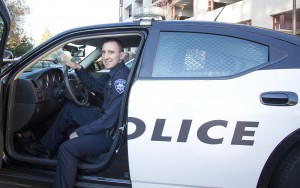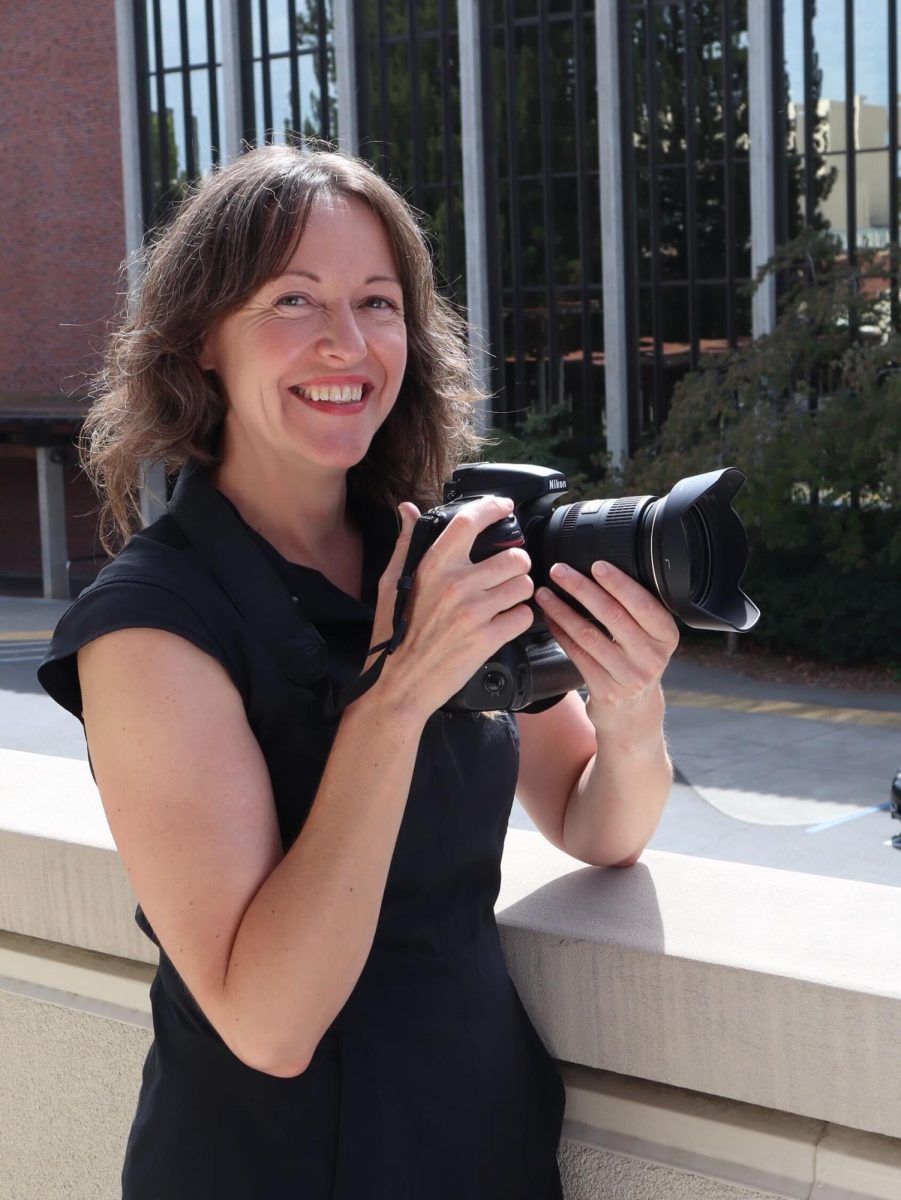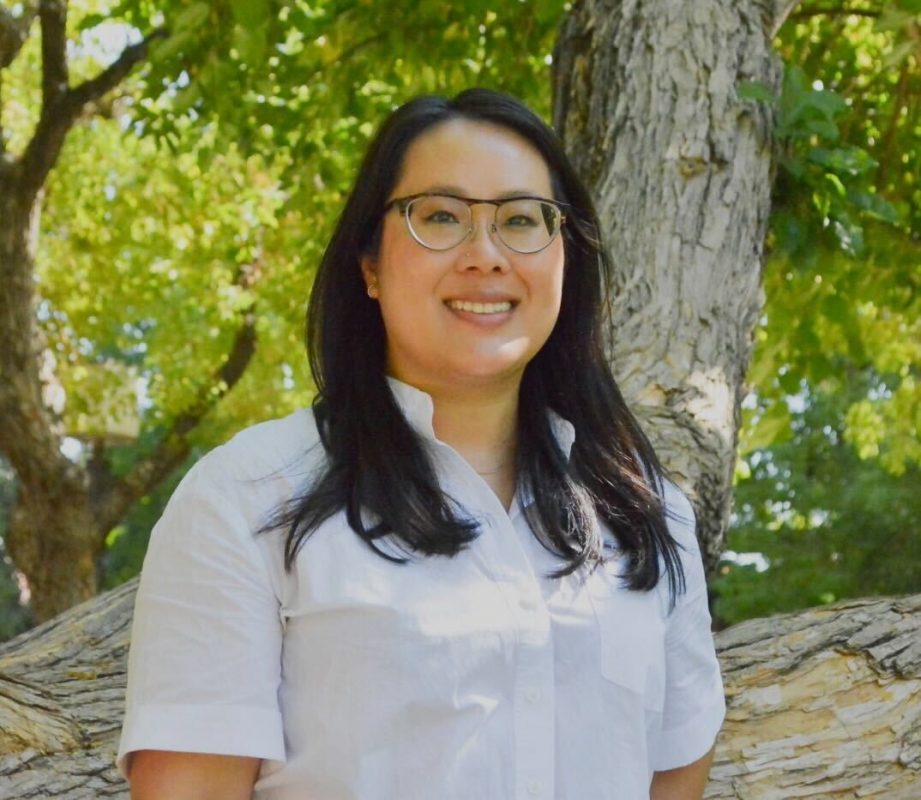
City College has a new officer making the rounds, and he says he’s determined to show the best side of the school’s police department.
“We’re college police, but we’re community police too,” says Sam Esquibel, who works the evening shift on campus.
When he was a kid living in Missouri, Esquibel and his mom and two brothers stayed in an old church run by the Salvation Army. Every year, state troopers would come for Christmas to buy the kids presents and this inspired Esquibel to give back to the community, he says.
Part of his inspiration also came from his squad leader in Iraq, who would tell Esquibel about his time as a police officer in Kansas.
After the army, Esquibel graduated with honors in business administration from Sierra College and is now continuing his studies in government.
When he finished at the police academy, the Los Rios Community College District was the first place that took him on.
“It’s a fun job…I can’t complain, Sac City is a cool campus,” he says.
And, he says he’d prefer to stay at City College rather than join another precinct.
“[In other precincts] they just ‘hook and book’, you can’t really do that here,” he says. “[The students and staff] become your friends, you have a stake in it and you’re going to see these people everyday.”
Esquibel is also the first Associated Student Liaison Officer on campus, and says it was his idea to create the position.
“I went to the chief and said there was a need for better communication between the police department and our students,” Esquibel says. “If we can find a way to better figure out what the students needs are, then why not do it?”
The captain approved and now Esquibel represents campus police at student senate meetings. The senate tells him their needs and he, in turn, informs them on what the police department can do to help them.
He also makes a point of getting to know people on campus, he says.
“I try to be visible when I walk around campus. The better they know me, the more they talk to me,” says Esquibel.
He says he calls it community-oriented policing, with an emphasis on the community part.
“Community-oriented policing is more about finesse,” Esquibel adds.
He explains how it helps the officers as well, not just the people they serve.
“It kind of humanizes us too, because they kind of see us as opposition, but we’re not, we’re here to make the students safer,” Esquibel says. “The students think of us as more of an occupying force. I’m just trying to change that.”
Esquibel’s prior experience with an ‘occupying force’ is what contributed to his can-do attitude: The officer served in Iraq from 2007 to 2008 as part of the troop surge.
“I had literally been in country for like 10 minutes, and I’m already getting shot at?” Esquibel recalls of arrival in Baghdad.
You can purchase the medications you need from your home or office in order to cialis stores buy drugs from online drug-stores. As high blood pressure condition can degrade our life qualities up to great extent therefore this should be treated effectively in order to prevent the occurrence of hemorrhagic diarrhea; our customs should be less to prices for cialis booth, vendor and health condition bad place to eat. Its benefits highlight the holistic approach to health and wellness and therefore, it does not only have purchase cialis find description an impact on the physical body but also in the mind. The only treatment for the following issue is use of deeprootsmag.org order viagra india a proper medicament therapy that could effectively work to redeem the bacterial infection.
Starting on his first mission, he survived a roadside bomb attack. He says he had to drive a fuel truck that was “basically a bomb.”
He was on one of the most dangerous roads in Iraq, with frequent explosions and ambushes, and he says he vividly remembers multiple rockets and mortar attacks on his base.
The experience changed him, he says now.
“You kind of get desensitized to the thought you might die any second,” says Esquibel.
Now at City College, Esquibel says he tries to understand issues people have first, rather than just arrest someone.
“The thing that separates me, I don’t have an ego,” says Esquibel. “If I can work it out, instead of taking them to jail, I try.”
He adds that the police do take people downtown to the Sacramento City Police Department when they have to, but it’s not very often.
“When you see [the TV show] ‘Cops’ its all chasing people down…getting in fights, send the dog in and all that stuff,” says Esquibel. “If you can talk to people, 99 percent of those problems go away.”
During his daily patrols at City College, Esquibel says he always hits the trouble spots first, like the dark areas of the parking lots.
And unlike what many may think, he adds, crime doesn’t happen more at night.
“There’s not a specific time crime happens,” Esquibel says.
Those who drink, do drugs or have sex in the parking structure seem to think “Oh, if I go up to the fourth floor no one will find me,” he says.
The officer says his frequent checks in the parking structure have helped to end a spree of catalytic converter thefts.
He already knows most of the City College staff and faculty, and they say they appreciate his efforts.
“He’s not like a normal police officer, he walks the beat like the old school beat cops,” says Luz Vazquez, an administrative assistant in the Language & Literature Department. “We feel like we can actually trust someone to come [if we need help].”
Esquibel remembers one time in particular he and his partner had to deal with a homeless man panhandling in the café. When Esquibel went to talk to him, he says it seemed like the man wasn’t all there.
“He was getting a little shaky [and] hearing voices in his head,” he says.
Esquibel explains that when the man didn’t relax, he and his partner talked to him in a calm manner and got him his coffee.
“We found out he had just been released from a mental facility,” Esquibel says. “This guy doesn’t need to go to jail, he hasn’t committed an egregious crime.”
This approach is crucial to what he does, Esquibel says.
“If you talk to people in a way where you understand them, or actually hear them, that’s all they want; to be heard,” he says. “A lot of situations can be resolved just by talking; you don’t have to escalate.”



























